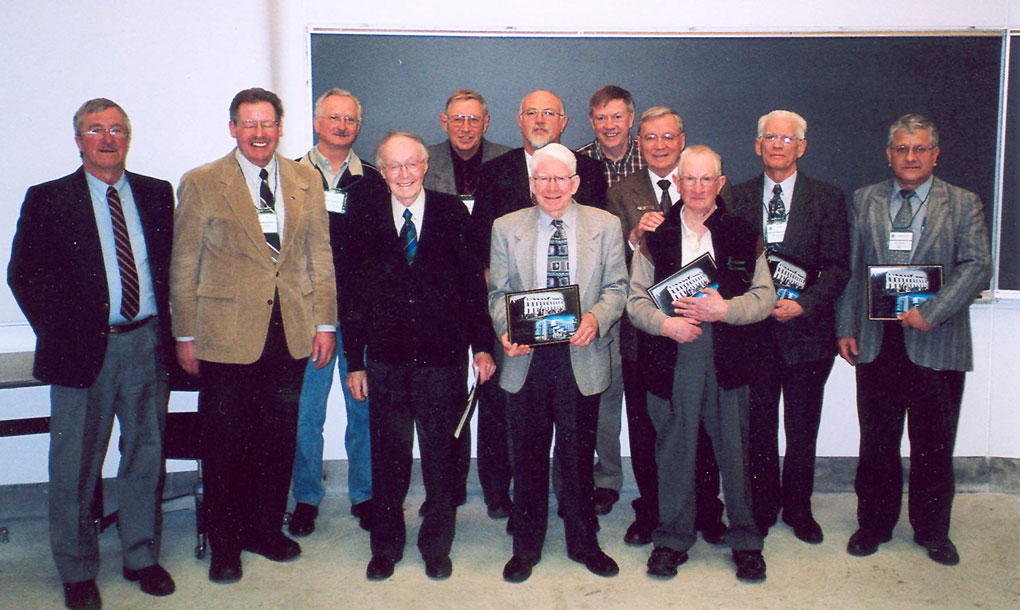The Soils and Crops Workshop began in 1965 and has been offered annually for over 50 years. The annual workshop is a two day event presenting updates on current research being conducted in the areas of soils, crops and economics by researchers, faculty and graduate students from across western Canada. The second day offers a workshop based on invited presentations designed to provide in-depth training on a variety of topics emphasizing agronomy.
The Saskatchewan Institute of Agrologists (SIA) and the Certified Crop Advisor (CCA) program recognize this event as a professional development opportunity.
2026 Organizing Committee
Loading...
Past Agronomy Workshop Themes
The Agronomy workshop on day 2 was added to the Soils and Crops Agenda in 2009. The themes for the Agronomy workshops have been as follows:
- 2009 Pesticide Resistance Workshop (Chair: Tom Jensen)
- 2010 Soil and Water (Chair: Tom Jensen)
- 2011 Crop Establishment (Chair: Sherrilyn Phelps)
- 2012 Nutrient Management (Chair: Dr. Patrick Moolecki)
- 2013 Canola Agronomy (Chair: Trish Meyers)
- 2014 Emerging Crops (Chair: Lyle Cowell)
- 2015 Plant Disease Issues on the Prairies (Chair: Dr. Randy Kutcher)
- 2016 Pests and Pulses (Chair: Erin Campbell)
- 2017 Retooling the Ag Diagnostics Toolbox (Chair: Ryan Hangs)
- 2018 Soil-What's in the Horizon? (Chair: Scott Anderson
- 2019 Mind Your P...Bring Your Q's, Northern Great Plains 4R Fertilizer P Management Symposium (Chair: Joel Peru)
- 2020 “Cutting through the BS (Biological Stress): Understanding the insects, pathogens, and weeds pestering crop production” (Chair: Dr. Melissa Arcand)
- 2021 The ABC's of Abiotic Stress (Chair: Sara Lemmerich)
- 2022: Small Grains, Big Gains (Chair: Dr. Megan House)
- 2023: Nutrient Movement in the Environment: (Re)Use Them, Don't Lose Them (Chair: Jennifer Bodgan)
- 2024: From Breeding to Bin: Climate-smart crops for future food security. (Chair Dr. Shayeb Shahariar
- 2025: The Digital Ag Revolution: From Firmware to Farms (Chair: Nathan Trowell)
- 2026: TBA (Chair: Abimfoluwa Olaleye)
History of the Conference
In the beginning, the Saskatchewan Agricultural Services Coordinating Committee directed the work of the Saskatchewan Advisory Fertilizer Council (SAFC); particularly, the development of the reference Guide to Farm Practice in Saskatchewan for farmers.
Every three years, the SAFC would host a conference to discuss updates to the Guide’s recommendations. Initially, the SAFC was chaired by Dr. Don Rennie (Dept. of Soil Science, U of S) with Earl Johnson (Saskatchewan Agriculture, Soils Specialist) as the secretary.
Members representatives from all federal agriculture research stations, the fertilizer industry, Plant Products (now the Canadian Food Inspection Agency), and a farmer. Subsequently, the SAFC established a regular annual winter meeting, to review field research plot data, approve soil test laboratory benchmarks, and develop or refine annual fertilizer recommendations. Eventually, they found this research knowledge transfer to be more effective by preparing formal papers and presentations among themselves through a workshop format.
The first formal workshop (called the Soil Fertility Workshop) was held in 1965 at Marquis Hall on the University of Saskatchewan campus and was sponsored by the SAFC and the extension division of Saskatchewan Agriculture.
As the scope of this agronomy workshop became increasingly diversified, Les Henry (Dept. of Soil Science, U of S) and Ken Kirkland (Dept. of Plant Sciences, U of S) collaborated to incorporate both soil and plant sciences research during the workshop and its name was changed to Soil Fertility and Crops in 1977.
In 1978, the present Soils and Crops name was adopted. In the 1980s, graduate students began presenting their research at the workshop, allowing them to hone their oral and poster presentation skills. The workshop committee has further incentivized students since then by providing presentation and travel awards. The annual Soils and Crops workshop is a now a two-day event highlighting current research conducted by faculty, researchers, and graduate students from across western Canada across myriad disciplines: soil biology, fertility, and water management; crop development and protection (weed, disease, and insect management); along with agricultural economics and engineering. The first day is primarily focused on graduate student presentations, with an agronomy workshop on the second day, consisting of invited presentations, designed to provide in-depth training emphasizing various timely topics. Except for 1970, all the past proceedings are available for download from our website, so please avail yourself of this tremendous knowledge resource!
40 Years of Soils and Crops, celebrated February 2007, Vet Med Bldg, USask


